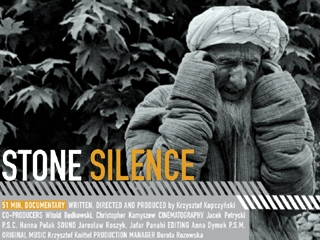Stone Silence
It's a story of crime and punishment, primitive justice, human culture at its most medieval. It's a masterful documentary, full of pathos and character, which through sensitive crafting finds beauty in tragedy.
 Amina is stoned to death for infidelity. Before the dust has settled her community, those guilty of her brutal killing, is already closing in on itself. A wall of silence now surrounds the village of Spingule, tucked away in a remote valley of Northern Afghanistan. Caught in the house of a man who was not her husband, Amina's sentence was to be stoned to death, and the village wasted no time in seeing that it happened. Through interviews with Amina's family and with her lover, this powerful and moving documentary pierces through the veil of shame and secrecy that now surrounds Amina's death.
Amina is stoned to death for infidelity. Before the dust has settled her community, those guilty of her brutal killing, is already closing in on itself. A wall of silence now surrounds the village of Spingule, tucked away in a remote valley of Northern Afghanistan. Caught in the house of a man who was not her husband, Amina's sentence was to be stoned to death, and the village wasted no time in seeing that it happened. Through interviews with Amina's family and with her lover, this powerful and moving documentary pierces through the veil of shame and secrecy that now surrounds Amina's death.
The dramatic landscape of the Pamir Mountains is a haunting presence throughout this story. In Spingul, a man points to Amina's grave: 'We don't know if Amina had a heart attack or committed suicide.' Rumours of a stoning drew the media's attention to the case and a local Afghan government official sent clerks and doctors to examine the body. They concluded that the young woman had died of a heart attack.
Karim is the man accused of being Amina's lover. His family has also been branded by the scandal. Karim was beaten several times and forced to spend six months fleeing from the villagers' wrath. He denies any involvement with the victim but his voice shakes with fear. 'I don't know anything about the fact that Amina had some feelings for me. She had a husband in Iran. Her parents made up the whole story. I don't know anything about it.' His mother remembers how a delegation of mullahs came to seek her agreement for the punishment of her own son and of Amina. She refused, but she claims that the girl's mother was eager to consent.
In harsh words, Amina's mother condemns her daughter's suspected adultery. To her, this breach of Islamic law is a stain that can never be wiped off: 'She lost her path and left us irritated without honour. A thousand times I've forgiven those who have my daughter's blood on their hands.' Amina's mother knew that her daughter was unhappy and dissatisfied with her life, but she remains unsympathetic. In her eyes, she has deserved her cruel fate. Then she takes off her Burka, and for a brief moment the sorrow in her face contrasts with her pitiless words. In her stern Islamic world, respect for Allah's law takes precedence over personal feelings. In a revealing aside, the local mullah confirms her views: 'In Islam, there are no personal opinions. There are God's decisions and prophet's issues.'
Amina's parents were sentenced to six years in prison by the court in Argu. However, the police and prosecutor set them free even though the accused admitted that they had decided to stone her. The judge was irate: 'Where is conscience and responsibility? (...) Each case, which darkens our country and people is a tragedy. I can't tolerate that. You need to have a heart to improve our country.'
Written and directed by Krzysztof Kopczyński
FULL SYNOPSIS
Written and directed by Krzysztof Kopczyński
